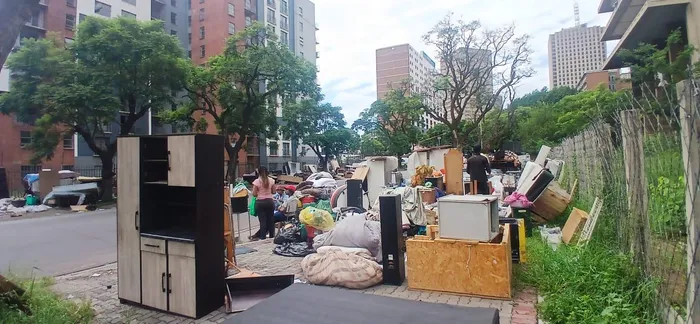Tshwane's social housing projects face challenges from rent boycotts

Recent evictions at Thembelihle Village, a low-cost housing project in Pretoria's CBD, have left residents without a place to call home after they failed to pay rent.
Image: Oupa Mokoena / Independent Media
Rent boycotts and disruptive behaviour from non-paying tenants are posing significant sustainability challenges to private social housing projects in the City of Tshwane.
MMC for Housing and Human Settlements, Aaron Maluleka, has expressed concern that government-initiated housing projects for individuals earning R11,301 to R22,000 monthly are being undermined by tenants' non-payment of rent and disruptive behaviour.
This follows the recent eviction of tenants from Thembelihle Village, Tshwane's pioneering social housing project, amid prolonged disputes over rent and soaring electricity costs.
Thembelihle Village, a low-cost housing project launched by the government in 2018, has been plagued by issues stemming from tenants' non-payment of rent and utilities, ultimately leading to the property being placed under business rescue.
Yeast City Housing NPC, the manager of Thembelihle Village, recently reported that numerous tenants have defaulted on payments since 2019, causing financial strain on utilities, services, and rentals, with outstanding arrears nearing R60 million.
Maluleka stated that the townlands social housing project marks a significant milestone in Tshwane's quest for affordable housing solutions.
“This initiative is not merely about constructing buildings, but it is a transformative effort aimed at creating healthier, sustainable, and inclusive communities,” he said.
He explained that by offering subsidised rental fees, townlands provide a critical lifeline for individuals and families within the income band of between R1,850 and R22,000 per month, enabling them to access housing that is both affordable and conveniently located near the city centre.
He said: “As urbanisation continues to rise, so does the demand for affordable housing in urban centres. The townlands social housing project responds directly to this need, granting residents the opportunity to live close to their places of work and economic activities, ultimately contributing to the reduction of the housing backlog in our communities.”
The project is a collaborative effort between the Social Housing Regulatory Agency and Housing Company Tshwane to improve the quality of life for Tshwane residents.
Maluleka noted that while the social housing project marks a fresh start for many, it is crucial to recognise the challenges private social housing initiatives are currently facing.
“The reports of rent boycotts and disruptive behaviour from individuals who evade their rental obligations are concerning. Such actions undermine the sustainability of social housing initiatives and place undue pressure on both the government and responsible tenants striving to fulfil their commitments,” he said.
He said his department advocates for a proactive approach in light of these challenges.
“We urge residents who experience a change in their economic circumstances to communicate with our department. Our goal is to redirect assistance to those who need it most, ensuring that no family is left behind during these trying times. The complexity of housing affordability necessitates transparency and cooperation between tenants and housing authorities, as we work together to build a stronger, unified community,” he said.
Maluleka called on the public and stakeholders to support the city's efforts to tackle homelessness and address long-standing housing issues in the municipality.
“The reduction in grant funding for human settlements in metropolitan municipalities diminishes our financial bandwidth, necessitating a sharper focus on essential trading services, including energy, water, sanitation and solid waste management,” he said.
rapula.moatshe@inl.co.za